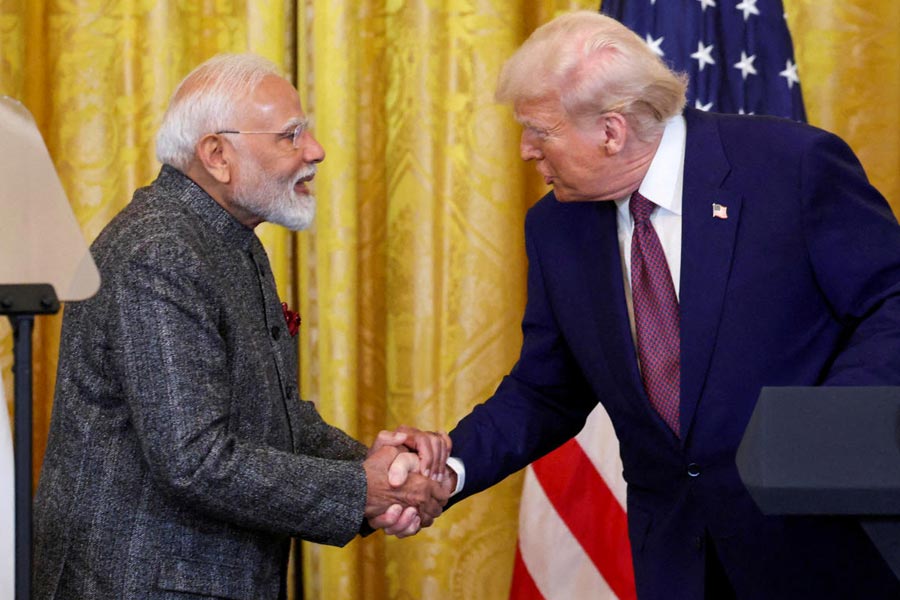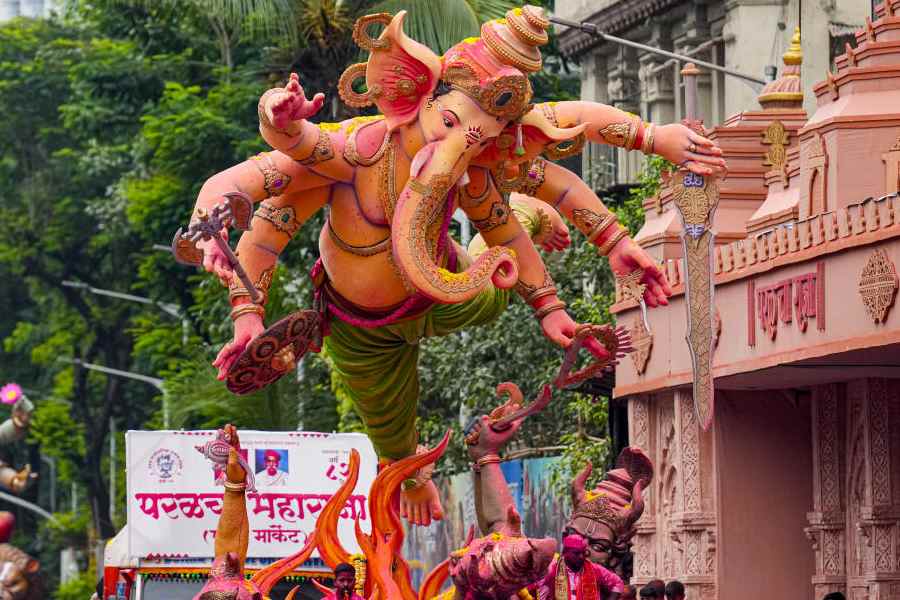 |
| Prime Minister of Trinidad and Tobago Kamla Persad Bissessar (in red sari) visits her ancestral village Bhelupur in Bihar’s Buxar district on Wednesday. (PTI) |
Patna, Jan. 11: Her eyes welled up and emotion gushed through her choked voice as Trinidad and Tobago Prime Minister Kamla Persad Bissessar found thousands of villagers chanting “Pradhan mantri beti (Prime Minister daughter)” at Bhelupur, her ancestral village in Bihar’s Buxar district, today.
Two choppers, carrying the first woman Prime Minister of Trinidad and Tobago and a 25-member delegation, descended at the non-descript village, about 150km from the state capital, at 1.21pm amid villagers of Bhelupur and other neighbouring hamlets dancing, singing and clapping to greet their “maati ki beti (daughter of the soil)”.
Bissessar’s great-grandfather, Ramlakhan Mishra, according to the records of the Trinidad and Tobago government, had migrated as indentured labourer, along with 1,48,000 others from Bihar and Bengal to the Caribbean islands to work in sugar and cocoa plantations between 1845 and 1917.
Bissessar, who had come to India to attend the Pravasi Bharatiya Divas in Jaipur, used the opportunity to visit her roots for the first time as she descended on the village, accompanied by her foreign minister, Sheoratan Rambachan, Indian high commissioner to Trinidad, Malay Mishra, apart from a few of her close relatives.
Her eyes were numb as she narrated the struggle her ancestors went through in the Caribbean to survive and save their culture and tradition. “They carried Bhagavad Gita and Ramayana besides the food habit and culture that they zealously guarded through their battle for living,” Bissessar, wearing a red and shiny Indian-style sari, said.
She was, however, quick to add that the life and culture has changed with the passage of time. This became evident when she started her address to the inquisitive crowd saying: “Bhaiyon aur bahno pranam (greetings to brothers and sisters)” but later switched over to English that was translated into Bhojpuri for the villagers.
That Bissessar has gone a long way to morph herself into the first woman leader of the United National Congress-led People’s Partnership ruling Trinidad and Tobago, from her semi-literate ancestors, is evident from the fact that she graduated in law and went on to become the first woman attorney-general of Trinidad and Tobago.
In fact, in her address to the people, she exhorted: “Education is the strongest weapon in your hands. Educate your children as it holds the key to the ultimate liberation.” She also said she was falling short of words to describe her feelings about the land, which her forefathers hailed from.
Bissessar’s relative, Girija Devi, kept wiping her tears as she went to see the former off near the chopper. Bissessar, too, broke into tears and said: “I will treasure your memory. I will never forget you.” Bissessar, born in 1952, is the grandmother of two children. She assured her relatives and the villagers to inspire her children to visit their roots.
Shailendra Raju, a resident, told The Telegraph that the villagers gave her a chunk of the soil and a silver crown besides khoincha (a traditional parting gift containing coins and rice coloured in yellow), conventionally given to a daughter at the time of leaving her parents and home after marriage.
Bissessar’s visit revived the pain that the labourers had left behind while they were being transported by the British to alien land as slaves. The pain found its manifestation in the folklore that still survives in this part of the world. “Paniya ke jahaj mein paltaniya leke gailey (In the ship they took our dear ones in hoards to unknown destination)” is a popular Bhojpuri folk song still sung in the memory of the people who had left the country.











